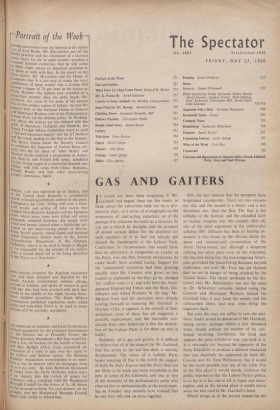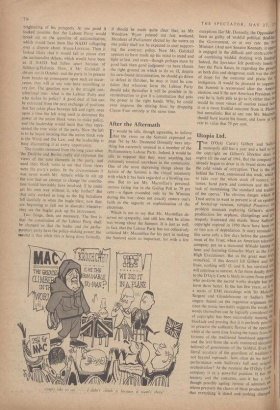GAS AND GAITERS
T would not have been surprising if Mr. I Gaitskell had begun, these last few weeks, to think about the attractions held out by- a pro- fessorial chair, or a series of monographs on the economics of contracting industries, or -a' life peerage. For whatever his faults as a tactician, he can see a church by daylight, and the prospect of almost certain defeat for the platform (or such members of it as had not already got aboard the bandwagon) at the Labour Party Conference, in circumstances that would leave him no alternative to resignation as Leader of the Party, was one that, however unwelcome, he could hardly have avoided facing. Support for the `unilateralist' resolution had been growing steadily since Mr. Cousins, who grows no less foolish or pigheaded as the days go by, pledged `his' million votes to it, and with both the Amal- gamated Engineering Union and the Shop, Dis- tributive and Allied Workers 'in the bag,' Mr. Michael Foot and his associates were already looking forward to removing Mr. Gaitskell in October. (This, it appears, is the summit of their ambitions; none of them has yet suggested a possible replacement, and the inevitable con- clusion from their behaviour is that the destruc- tion of the Labour Party is for them an end in itself.) Suddenly, all is gas and gaiters. It is difficult to believe that all of the support for Mr. Gaitskell that has arisen in the last few days is entirely disinterested. The views of a Labour Party leader enjoying (if that is the word) the support of both the Daily Express and the Daily Mail are not likely to be made any more acceptable in the eyes of some of his followers, and one or two of the members of the parliamentary party who cheered him so enthusiastically at the party meet- ing on Tuesday may recently have realised that he and they will sink oir, swim together. Still, the fact remains that his prospects have brightened considerably. There are two reasons for this, and the second is a better, and a less fortuitous one, than the first. The first is the collapse of the Summit, and the rekindled faith in nuclear weapons that this created; after all, one of the chief arguments in the unilateralist syllabus (Mr. Zilliacus has been its leading ex- ponent) is that based on the obvious desire for peace and international co-operation of the Soviet Government, and although a desperate rallying has taken place even on this argument, the line now being that the warmongering Ameri- cans provoked the peace-loving Russians beyond endurance, not even Mr. Foot has yet claimed that we are in danger of being attacked by the United States. The shock produced by the dis- covery that Mr. Khrushchev was not the same as Dr. Schweitzer certainly, helped swing the General arid Municipal Workers behind the Gaitskell line; it may keep the miners and the railwaymen there, and may even bring the engineers back.
But even this may not suffice to save the plat- form. And it would be disastrous if Mr. Gaitskell, seeing victory perhaps within a few thousand votes, should attempt yet another of his cele- brated revolving resolutions, the kind that appears the same whichever way you look at it. It is obviously not beyond the ingenuity of the Party Executive to produce a defence resolution that can cheerfully be supported by both Mr. Cousins and Sir Tom Williamson, but it would be the worst possible way out of the crisis. For in the first place it would merely reinforce the publid impression that the Labour Party's policy, in so far as it has one at all, is vague and mean- ingless, and in the second place it would throw away the best card in Mr. Gaitskell's hand.
Which brings us to the second reason for the brightening of his prospects. At one point it looked possible that the Labour Party would break up on the question of nationalisation, which would have been like NATO collapsing , over a dispute about Alsace-Lorraine. Then it looked likely that it would fall to pieces over the unilateralist debate,. which would hdve been as if NATO had fallen apart because of Schleswig-Holstein. Now, if Mr. Gaitskell is driven out in October, and the party in its present form breaks up consequent upon such an occur- _fence, they will at any rate have something to cry, for. The question now is the straight con- stitutional one: what is the Labour Party and who makes its policy? A good deal of fun can be extracted from the neat exchange of positions that has taken place between left and right; once upon a time. the left wing used to denounce the power of the union block votes to make policy, and the leadership would insist that they repre- sented the true voice of the party. Now the left is to be heard insisting that the union block vote is the Word and the Law, and the leadership is busy discounting it at every opportunity.
The trouble stemmed from the long years when ' the Deakins and Bevins really did represent the views of the sane elements in the party, and used their block votes to see that those views were the party's policy. In the circumstances it was never worth Mr. Attlee's while to stir up the row that an attempt to change the constitu- tion would inevitably have involved; if he could get, his own way without it, why bother? But that only worked as long as the big battalions fell dutifully in when the bugle blew; now they are beginning to fall out in disorder whenever they see the bugler pick up his instrument.
Two things, then, are necessary. The first is that the constitution of- the Labour Party shall be changed so that the leader and the parlia- mentary party have the Policy-making power; the ;mond is that while this is being done forinally. it should be made quite clear that, as Mr. Woodrow Wyatt pointed out last weekend, Members of Parliament elected by the voters on one policy shall not be expected to start support- ing the contrary policy. Now Mr. Gaitskell appears to have made up his mind to stand and fight at last, and even—though perhaps more by good luck than good judgment—to have chosen the right ground on which to do so. If, despite his new-found determination, he should go down to defeat in October, he may at least be con- fident that whatever form the Labour Party should take thereafter it will be possible in its reconstruction to give it a constitution that puts the power in the right hands. Why, he could even improve the shining hour, by dropping Clause Four entirely at the same time.







































 Previous page
Previous page